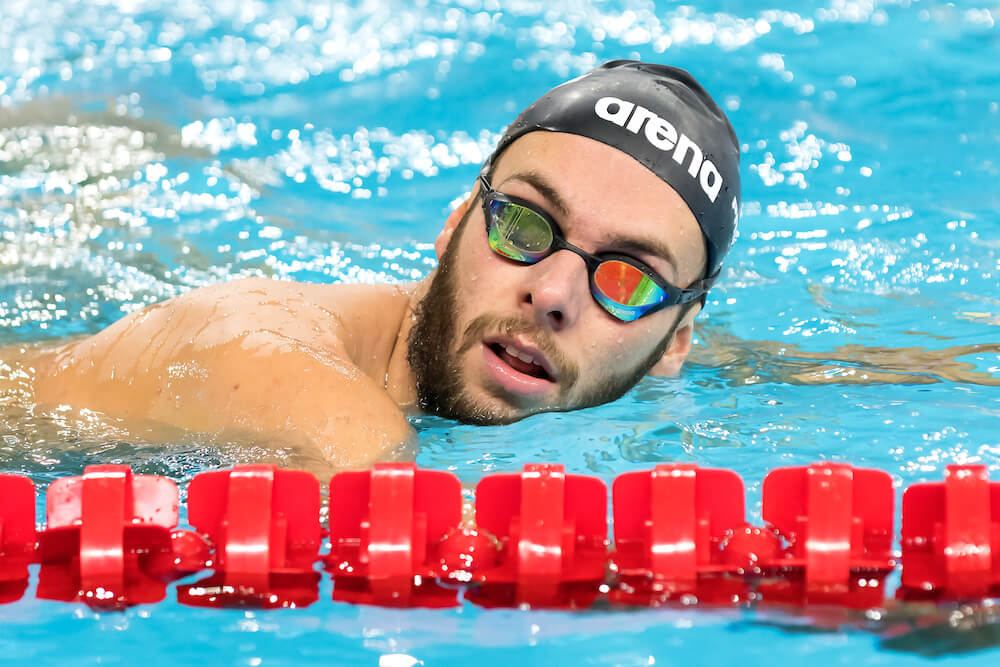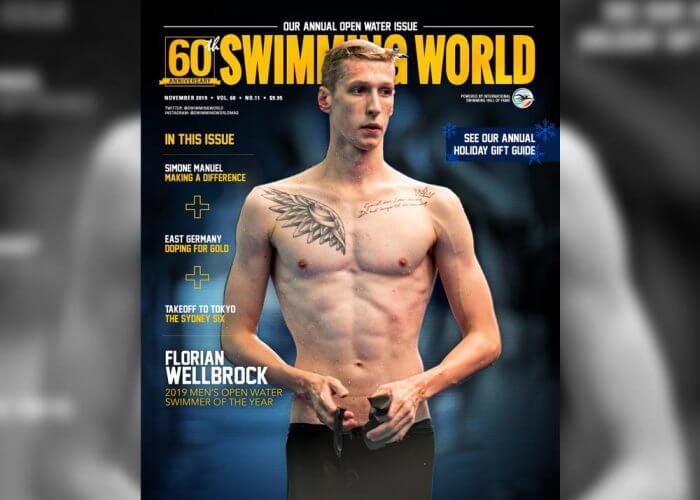Men’s 1500 Freestyle in Tokyo: Will It Be Another All-European Final?

Men’s 1500 Freestyle in Tokyo: Will It Be Another All-European Final?
Something interesting happened in the men’s 1500-meter freestyle final at the 2019 World Championships: All eight finalists were Europeans. In fact, the 10-fastest swimmers out of prelims were all European-based, setting up an unusually homogeneous final. European distance swimmers have been on the rise since the 2016 Olympics, where Italian Gregorio Paltrinieri took the gold, and it culminated in this domination of the 1500 in 2019. However, the question becomes: Can they do it again in Tokyo?
The Top Tier
 There are three swimmers who have to be considered locks for the final, those being Italy’s Paltrinieri, Ukraine’s Mykhailo Romanchuk, and Germany’s Florian Wellbrock. The trio has sat atop the world rankings in the men’s 1500 free in some order for three straight years. Wellbrock won when the three raced in the 2018 European Championships, with Romanchuk second and Paltrinieri third, and they finished in that same order at the 2019 World Champs. However, defending gold medalist Paltrinieri reasserted himself with a 14:33.10 in August of this year, which is the second-fastest time in history. These are the only three men who have been under 14:40 since 2016, making them easy picks to move on to the finals in Tokyo.
There are three swimmers who have to be considered locks for the final, those being Italy’s Paltrinieri, Ukraine’s Mykhailo Romanchuk, and Germany’s Florian Wellbrock. The trio has sat atop the world rankings in the men’s 1500 free in some order for three straight years. Wellbrock won when the three raced in the 2018 European Championships, with Romanchuk second and Paltrinieri third, and they finished in that same order at the 2019 World Champs. However, defending gold medalist Paltrinieri reasserted himself with a 14:33.10 in August of this year, which is the second-fastest time in history. These are the only three men who have been under 14:40 since 2016, making them easy picks to move on to the finals in Tokyo.
The Other European Finalists
Behind those three, there are plenty of strong finals contenders. David Aubry of France was fourth at the World Championships in 14:44.72. It was a breakout for him, as in 2018 he did not swim under 15 minutes. Norway’s Henrik Christiansen was fifth in 14:45.35, and has been a staple in major international finals since the last Olympics. The other three finalists were Domenico Acerenza (Italy), Sergii Frolov (Ukraine), and Alexander Norgaard (Denmark). Acerenza was 14:52.0 twice at Worlds, and has since cut down to 14:49.98, while Frolov swam a lifetime best 14:55 in the prelims before coming back up to 15:01 in finals. Norgaard was the most interesting case, as he swam a 14:47.75 in prelims, an eight-second drop and new national record, before going just 15:20 in finals. He was streaky at Worlds, but was also just 19 and likely had little experience swimming two 1500s at the same meet.
The ninth and 10th spots were also occupied by Europeans in Damien Joly of France and Jan Micka of the Czech Republic. Joly was a Rio finalist and has consistently been in the mid-14:50 range since then. Micka has not been as consistent, but he does have a personal best of 14:48.52 from 2019.
The Challengers
Outside of Europe, the Americans and Australians both want to return to the final. Jordan Wilimovsky and Zane Grothe represented the United States in 2019, but finished just 11th and 26th respectively. Both men have been under 14:50 as recently as 2018, and Wilimovsky is a returning finalist from Rio, so expect them to be much better. Another intriguing American is Robert Finke, who smashed the American record in the yards version of this event back in February. Finke has been 14:48 in meters, but his short course improvements suggest that a significant drop could be coming.
Jack McLoughlin was the lone Australian 1500 swimmer in 2019, and he missed the final in 16th. McLoughlin owns a best time of 14:47.09 from 2018, indicating that he has the capability to final. However, he has come up short of his best on multiple occasions on the international stage, going over 15 minutes in both 2017 and 2019 at Worlds. Another interesting name from Australia is Thomas Neill, who reaped silver at the 2019 World Junior Champs with a 14:59.19.
Finally, Europe has some other swimmers that could challenge for these finals spots. Franko Grgic of Croatia swam a stunning 14:46.09 in 2019 as a 16-year-old, setting a World Junior Record. Grgic could certainly be under 14:40 by 2021, which would make him a medal contender. Another potential finalist is Great Britain’s Daniel Jervis, who has swum under 14:50 in both 2018 and 2019 but has never quite been able to put it together on the international stage.
The Verdict
Europe has been on the rise for a while in the distance events. In 2017, it had seven of eight World Championships finalists, and in 2019, it controlled the entire final. Looking ahead to 2021, it seems plausible the continent will hold down at least a majority of the slots. However, whether or not Europe fills the entire field will likely come down to how the Americans and Australians swim. If Wilimovsky, for example, can swim his best time, there certainly will not be eight Europeans faster than him. But if the Americans are off their game again, Europe can take the top eight slots.
Of the listed men, Paltrinieri, Romanchuk, Wellbrock, and Grgic are the easy picks for the finals. Christiansen and Aubry are also likely to get back after their 2019 performances, leaving two spots. It has to be expected that Wilimovsky, who has been consistent internationally, will be able to rejoin this final. The final spot will go to Acerenza after his impressive 14:49 earlier this year, giving Europe seven finalists. The Europeans do not take all eight spots at the Tokyo Olympics, but seven of eight is still quite a statement of dominance in the men’s 1500m free.



